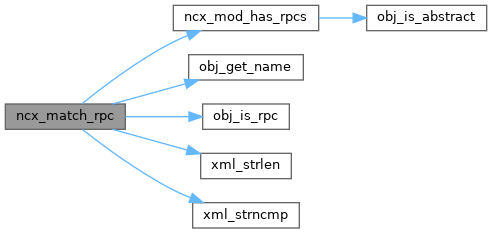 |
yumapro
25.10-4
YumaPro SDK
|
 |
yumapro
25.10-4
YumaPro SDK
|
Search functions for the ncx_module_t_ structure Find top-level constructs like rpc, data, notifications. More...

Functions | |
| obj_template_t * | ncx_match_rpc (ncx_module_t *mod, const xmlChar *rpcname, uint32 *retcount) |
| Check if a rpc_template_t in the mod->rpcQ. More... | |
| typ_template_t * | ncx_find_type (ncx_module_t *mod, const xmlChar *typname, boolean useall) |
| Check if a typ_template_t in the mod->typeQ. More... | |
| typ_template_t * | ncx_find_annotation (ncx_module_t *mod, const xmlChar *name, boolean useall) |
| Find an annotation. More... | |
| typ_template_t * | ncx_find_type_que (const dlq_hdr_t *typeQ, const xmlChar *typname) |
| ncx_find_type_que More... | |
| grp_template_t * | ncx_find_grouping (ncx_module_t *mod, const xmlChar *grpname, boolean useall) |
| Find the YANG grouping. More... | |
| grp_template_t * | ncx_find_grouping_que (const dlq_hdr_t *groupingQ, const xmlChar *grpname) |
| Check if a grp_template_t in the specified Q. More... | |
| obj_template_t * | ncx_find_rpc (const ncx_module_t *mod, const xmlChar *rpcname) |
| Check if a rpc_template_t in the mod->rpcQ. More... | |
| obj_template_t * | ncx_match_any_rpc_mod (ncx_module_t *mod, const xmlChar *rpcname, uint32 *retcount) |
| Check if a rpc_template_t is in the specified module. More... | |
| obj_template_t * | ncx_get_first_data_object (ncx_module_t *mod) |
| Get the first datastore object in the module. More... | |
| obj_template_t * | ncx_find_next_data_object (ncx_module_t *mod, obj_template_t *obj) |
| Check the next obj_template_t in in any module that matches the object name string. More... | |
| obj_template_t * | ncx_find_object (ncx_module_t *mod, const xmlChar *objname) |
| Find a top level module object. More... | |
| obj_template_t * | ncx_find_object_nsid (xmlns_id_t nsid, const xmlChar *objname) |
| Find a top level module object by module NSID. More... | |
| obj_template_t * | ncx_get_first_object (ncx_module_t *mod) |
| Get the first object in the datadefQs for the specified module. More... | |
| obj_template_t * | ncx_get_first_object_ex (ncx_module_t *mod, boolean augment_ok) |
| Get the first object in the datadefQs for the specified module. More... | |
| obj_template_t * | ncx_get_last_object (ncx_module_t *mod, boolean augment_ok) |
| Find the last data node. More... | |
| obj_template_t * | ncx_get_next_object (ncx_module_t *mod, obj_template_t *curobj) |
| Get the next object in the specified module. More... | |
| obj_template_t * | ncx_get_next_object_ex (ncx_module_t *mod, obj_template_t *curobj, boolean augment_ok) |
| Get the next object in the specified module. More... | |
| obj_template_t * | ncx_get_prev_object (ncx_module_t *mod, obj_template_t *curobj, boolean augment_ok) |
| Find the previous object node. More... | |
| obj_template_t * | ncx_get_next_data_object (ncx_module_t *mod, obj_template_t *curobj) |
| Get the next database object in the specified module. More... | |
| obj_template_t * | ncx_get_first_data_object_pick (ncx_module_t *mod, boolean config) |
| Get the first database object in the datadefQs for the specified module. More... | |
| obj_template_t * | ncx_get_next_data_object_same (ncx_module_t *mod, obj_template_t *curobj) |
| Get the next database object in the specified module. More... | |
Search functions for the ncx_module_t_ structure Find top-level constructs like rpc, data, notifications.
| typ_template_t * ncx_find_annotation | ( | ncx_module_t * | mod, |
| const xmlChar * | name, | ||
| boolean | useall | ||
| ) |
Find an annotation.
Check if a typ_template_t in the mod->annotQ
Check mod for the annotation called name. Use useall to check all submodules, but Not needed if submodules have been collaped.
| mod | ncx_module to check |
| name | type name to find |
| useall | TRUE to use all submodules; FALSE to only use the ones in the mod->includeQ |
| grp_template_t * ncx_find_grouping | ( | ncx_module_t * | mod, |
| const xmlChar * | grpname, | ||
| boolean | useall | ||
| ) |
Find the YANG grouping.
Check if a grp_template_t in the mod->groupingQ. Check mod for the grouping called grpname. Use useall to check all submodules, but Not needed if submodules have been collaped.
| mod | ncx_module to check |
| grpname | group name |
| useall | TRUE to check all existing nodes FALSE to only use includes visible to this [sub]mod |


| grp_template_t * ncx_find_grouping_que | ( | const dlq_hdr_t * | groupingQ, |
| const xmlChar * | grpname | ||
| ) |
Check if a grp_template_t in the specified Q.
| groupingQ | Queue of grp_template_t to check |
| grpname | group name |

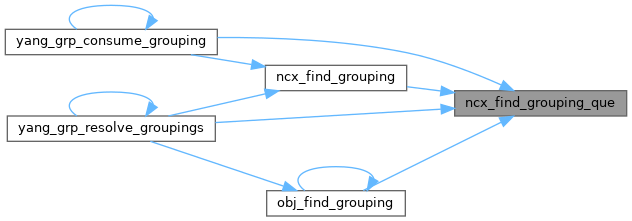
| obj_template_t * ncx_find_next_data_object | ( | ncx_module_t * | mod, |
| obj_template_t * | obj | ||
| ) |
Check the next obj_template_t in in any module that matches the object name string.
| mod | current module |
| obj | current object in curmod |
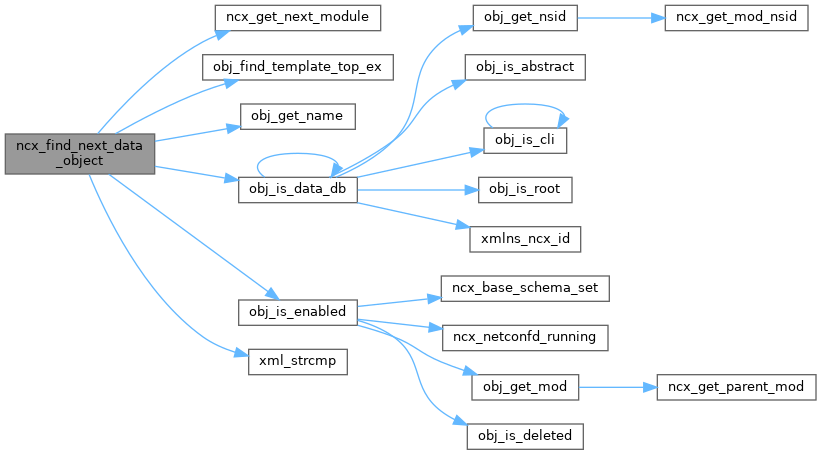
| obj_template_t * ncx_find_object | ( | ncx_module_t * | mod, |
| const xmlChar * | objname | ||
| ) |
Find a top level module object.
| mod | ncx_module to check |
| objname | object name to find |

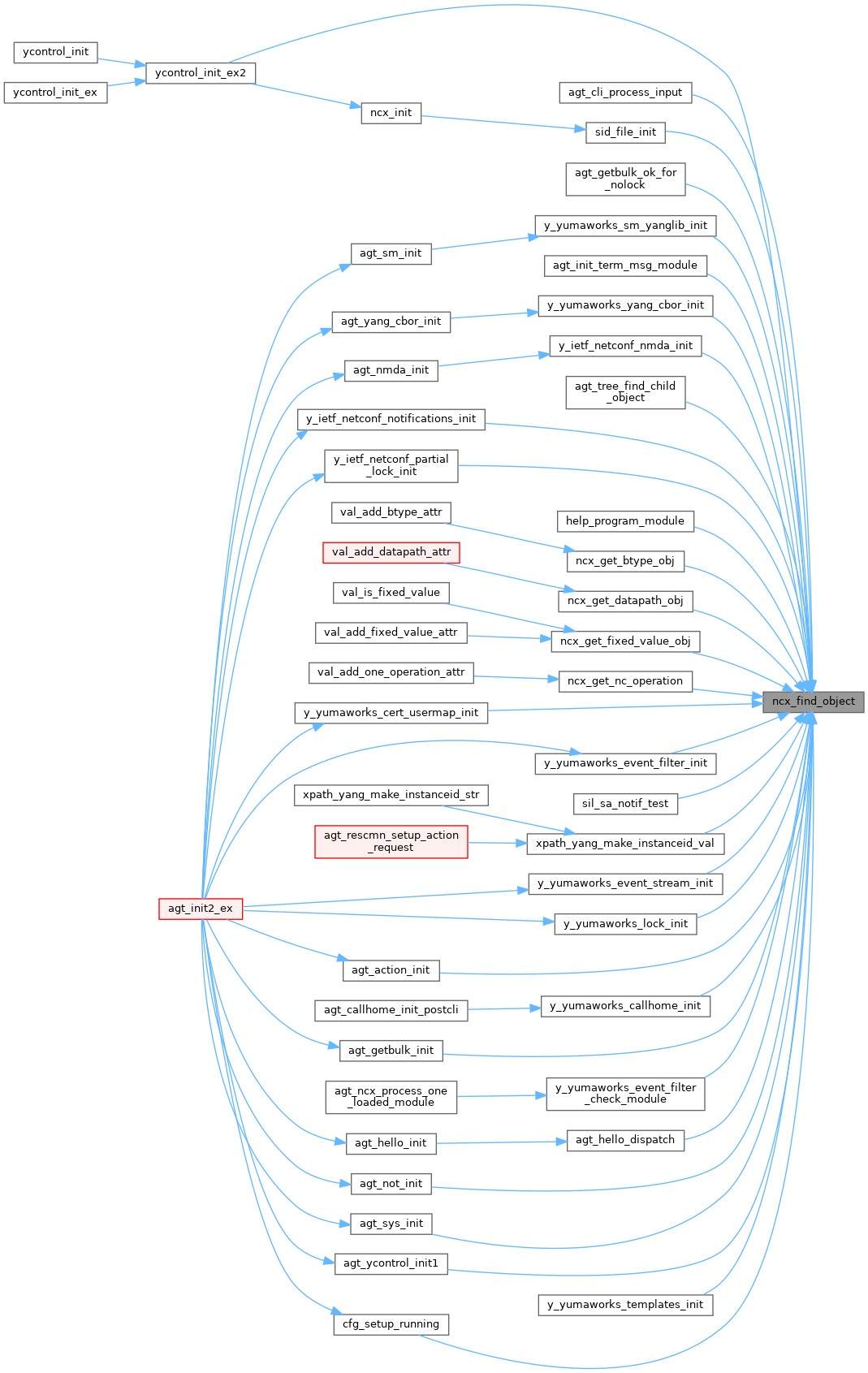
| obj_template_t * ncx_find_object_nsid | ( | xmlns_id_t | nsid, |
| const xmlChar * | objname | ||
| ) |
Find a top level module object by module NSID.
| nsid | namespace ID to check |
| objname | object name |


| obj_template_t * ncx_find_rpc | ( | const ncx_module_t * | mod, |
| const xmlChar * | rpcname | ||
| ) |
Check if a rpc_template_t in the mod->rpcQ.
| mod | ncx_module to check |
| rpcname | RPC name to find |

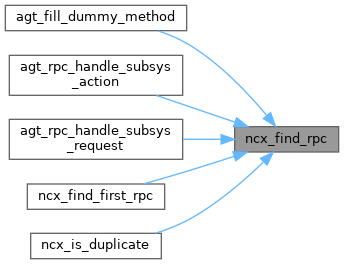
| typ_template_t * ncx_find_type | ( | ncx_module_t * | mod, |
| const xmlChar * | typname, | ||
| boolean | useall | ||
| ) |
Check if a typ_template_t in the mod->typeQ.
Check mod for the typedef called typname. Use useall to check all submodules, but Not needed if submodules have been collaped.
| mod | ncx_module to check |
| typname | type name to find |
| useall | TRUE to use all submodules; FALSE to only use the ones in the mod->includeQ |

| typ_template_t * ncx_find_type_que | ( | const dlq_hdr_t * | typeQ, |
| const xmlChar * | typname | ||
| ) |
ncx_find_type_que
Check if a typ_template_t in the specified Q of typ_template_t_ Usually this is the mod->typeQ queue
| typeQ | type Q to check |
| typname | type name to find |


| obj_template_t * ncx_get_first_data_object | ( | ncx_module_t * | mod | ) |
Get the first datastore object in the module.
Get the first database object in the datadefQs for the specified module
| mod | module to search for the first object |
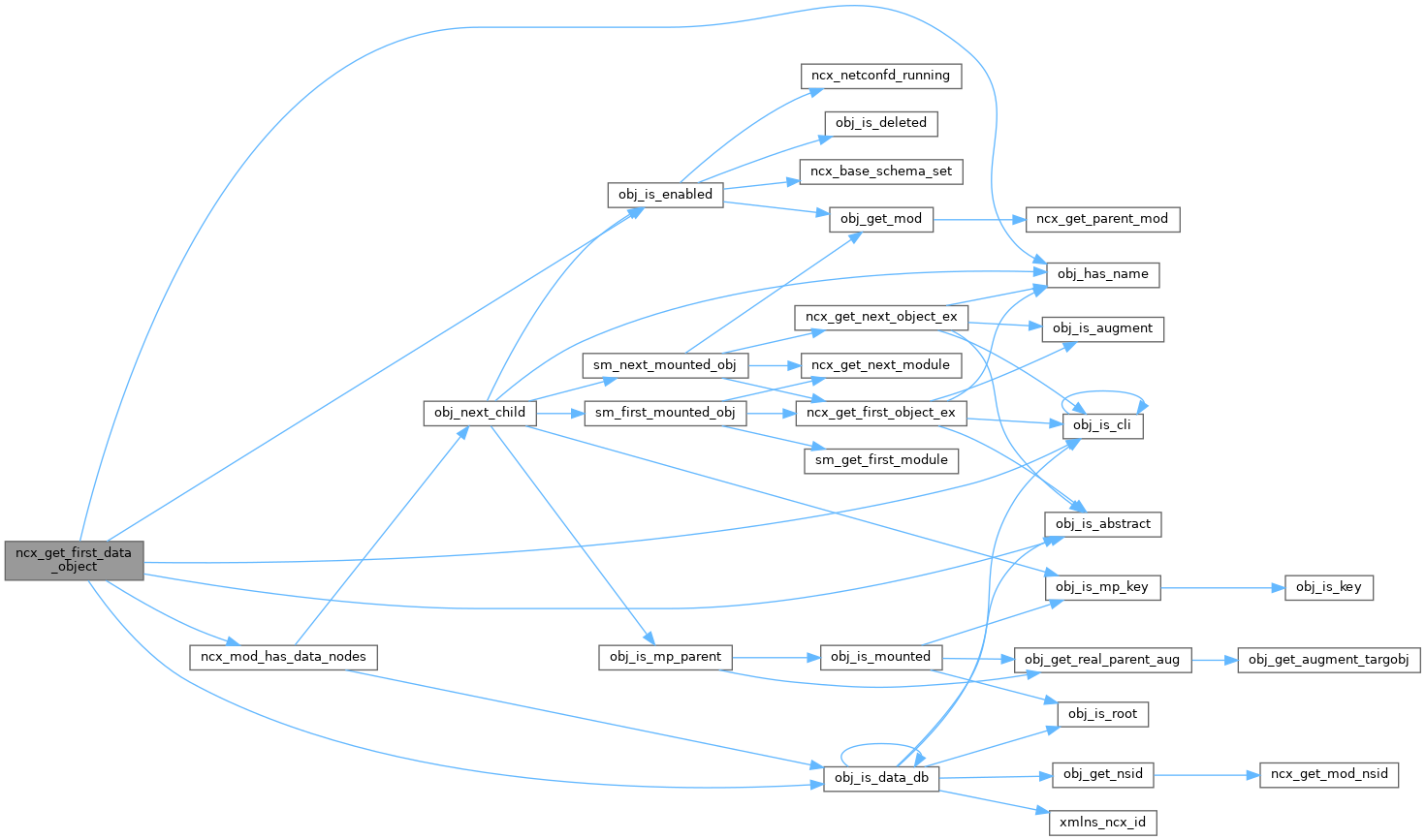
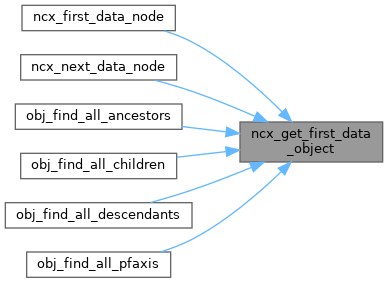
| obj_template_t * ncx_get_first_data_object_pick | ( | ncx_module_t * | mod, |
| boolean | config | ||
| ) |
Get the first database object in the datadefQs for the specified module.
| mod | module to search for the first object |
| config | TRUE for config node FALSE for non-config |
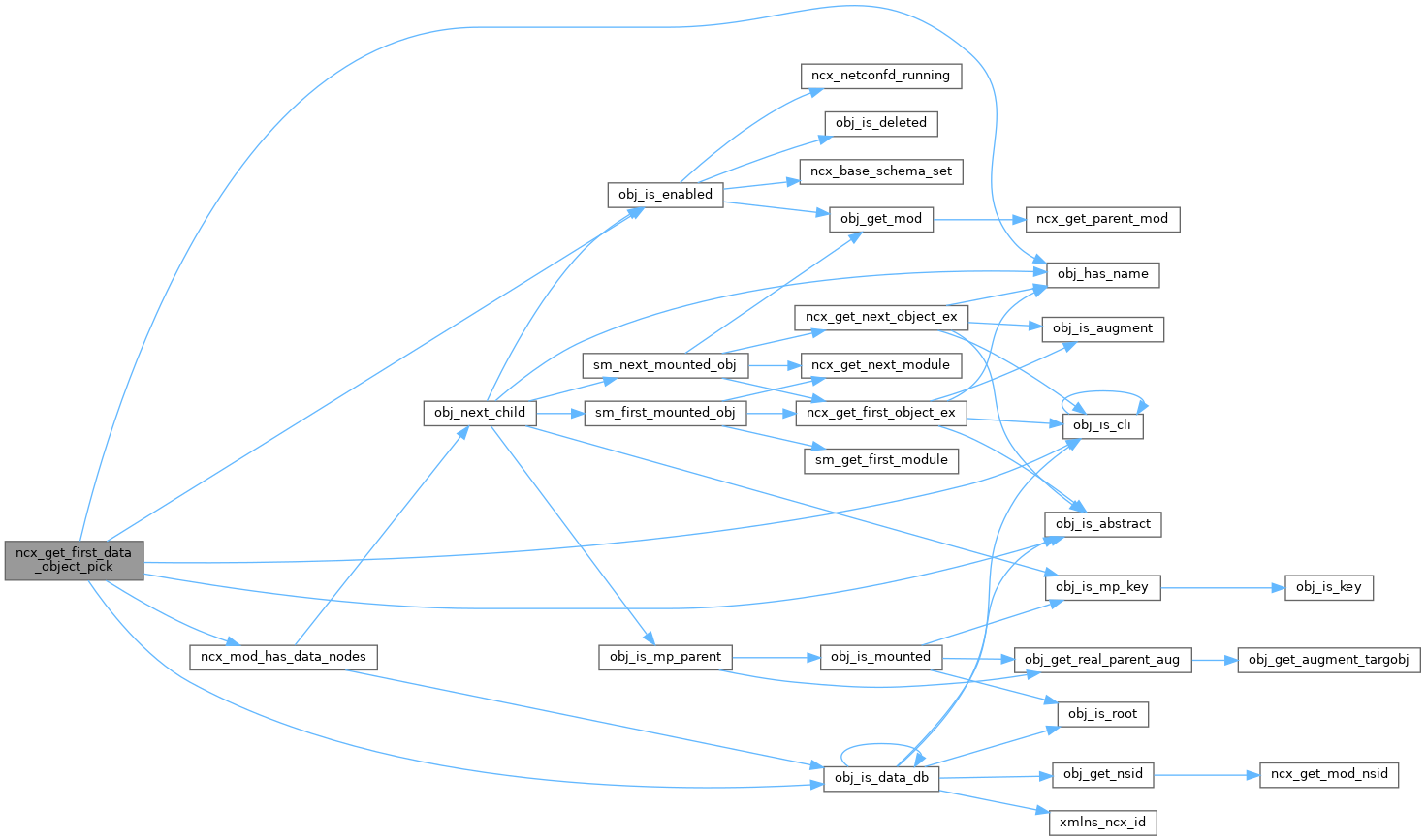

| obj_template_t * ncx_get_first_object | ( | ncx_module_t * | mod | ) |
Get the first object in the datadefQs for the specified module.
Get any object with a name
| mod | module to search for the first object |
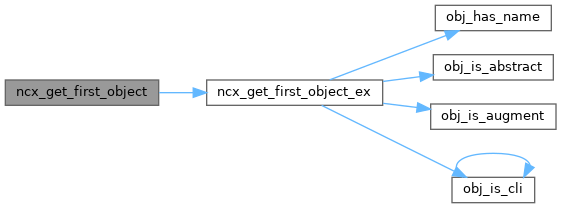

| obj_template_t * ncx_get_first_object_ex | ( | ncx_module_t * | mod, |
| boolean | augment_ok | ||
| ) |
Get the first object in the datadefQs for the specified module.
Get any object with a name
| mod | module to search for the first object |
| augment_ok | TRUE if return augment objects |
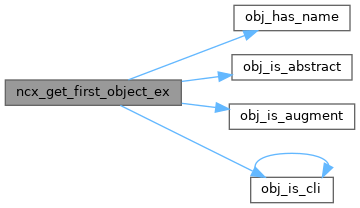
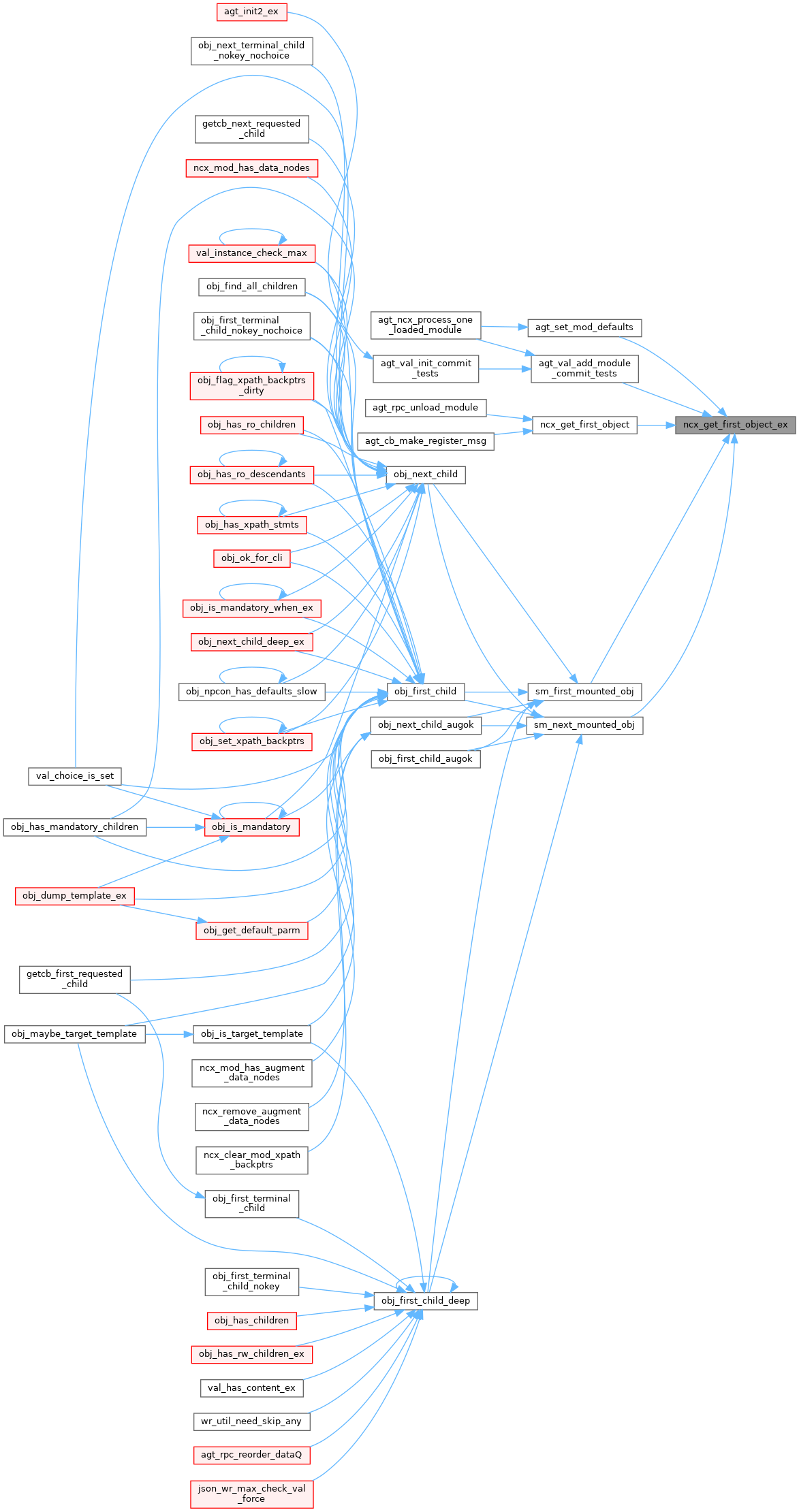
| obj_template_t * ncx_get_last_object | ( | ncx_module_t * | mod, |
| boolean | augment_ok | ||
| ) |
Find the last data node.
Get the last object in the datadefQs for the specified module Get any object with a name
| mod | module to search for the first object |
| augment_ok | TRUE if return augment objects |
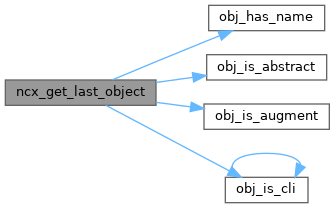

| obj_template_t * ncx_get_next_data_object | ( | ncx_module_t * | mod, |
| obj_template_t * | curobj | ||
| ) |
Get the next database object in the specified module.
| mod | pointer to module to get object from |
| curobj | pointer to current object to get next from |
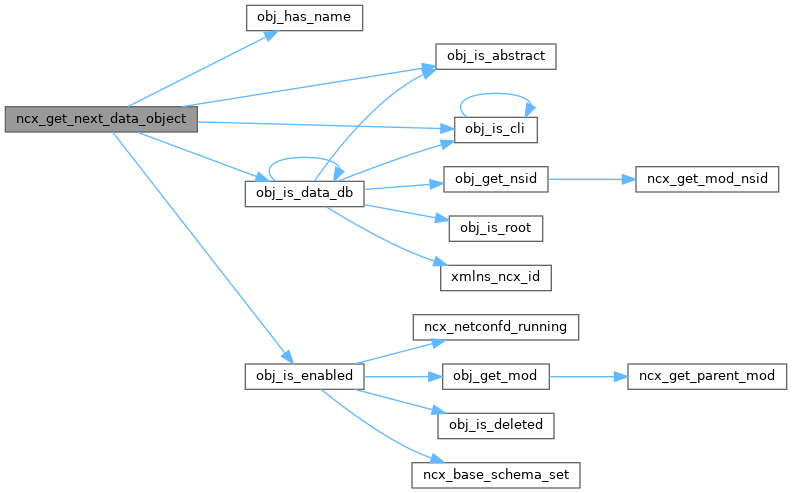
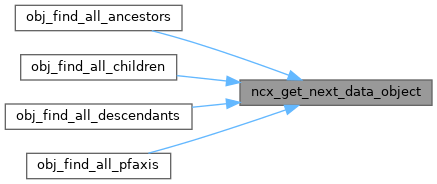
| obj_template_t * ncx_get_next_data_object_same | ( | ncx_module_t * | mod, |
| obj_template_t * | curobj | ||
| ) |
Get the next database object in the specified module.
Only get the same type of object as specified (config or non-config)
| mod | pointer to module to get object from |
| curobj | pointer to current object to get next from |
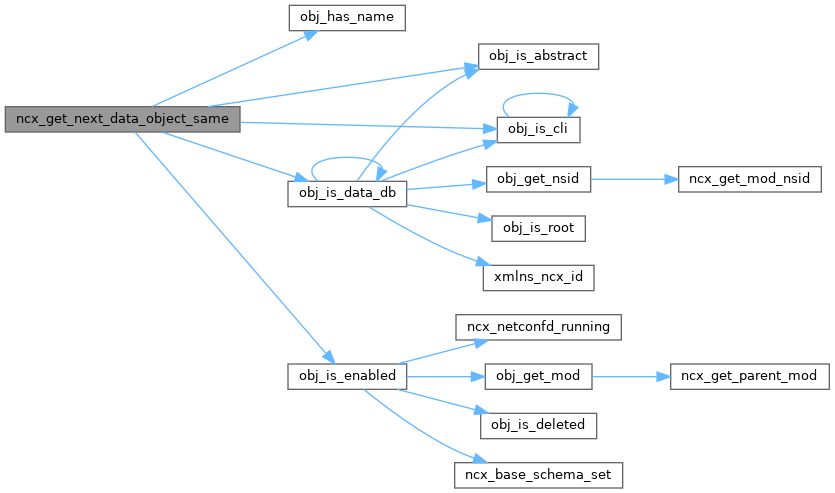

| obj_template_t * ncx_get_next_object | ( | ncx_module_t * | mod, |
| obj_template_t * | curobj | ||
| ) |
Get the next object in the specified module.
Get any object with a name
| mod | module struct to get the next object from |
| curobj | pointer to the current object to get the next for |
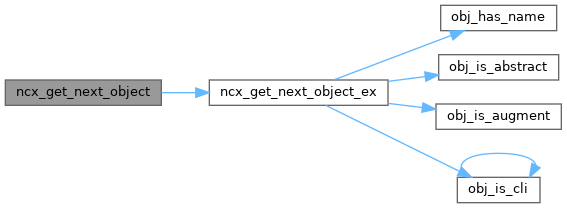

| obj_template_t * ncx_get_next_object_ex | ( | ncx_module_t * | mod, |
| obj_template_t * | curobj, | ||
| boolean | augment_ok | ||
| ) |
Get the next object in the specified module.
Get any object with a name Not used by netconfd!!! Will only check top-level database objects if ncx_moveroot_enabled true!!
| mod | module struct to get the next object from |
| curobj | pointer to the current object to get the next for |
| augment_ok | TRUE to include augment objects |
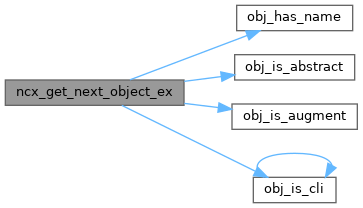
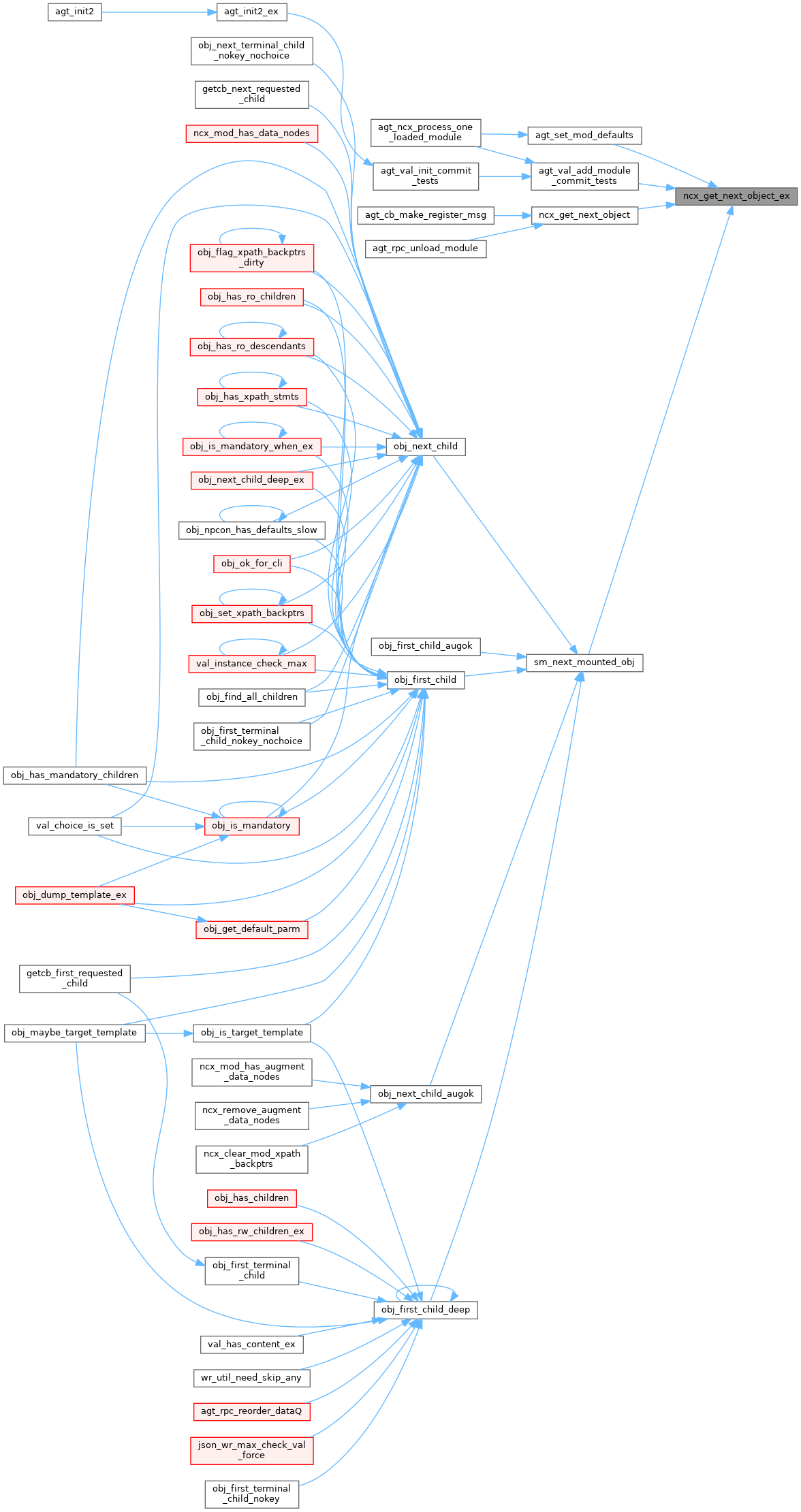
| obj_template_t * ncx_get_prev_object | ( | ncx_module_t * | mod, |
| obj_template_t * | curobj, | ||
| boolean | augment_ok | ||
| ) |
Find the previous object node.
Get the previous object in the specified module Get any object with a name
| mod | module struct to get the next object from |
| curobj | pointer to the current object to get the next for |
| augment_ok | TRUE to include augment objects |
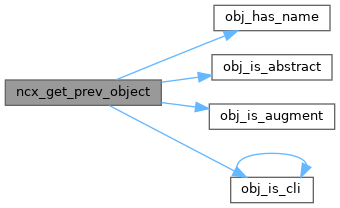

| obj_template_t * ncx_match_any_rpc_mod | ( | ncx_module_t * | mod, |
| const xmlChar * | rpcname, | ||
| uint32 * | retcount | ||
| ) |
Check if a rpc_template_t is in the specified module.
| mod | module struct to check | |
| rpcname | RPC name to match | |
| [out] | retcount | address of return count of matches
|

| obj_template_t * ncx_match_rpc | ( | ncx_module_t * | mod, |
| const xmlChar * | rpcname, | ||
| uint32 * | retcount | ||
| ) |
Check if a rpc_template_t in the mod->rpcQ.
| mod | ncx_module to check | |
| rpcname | RPC name to match | |
| [out] | retcount | address of return match count
|
